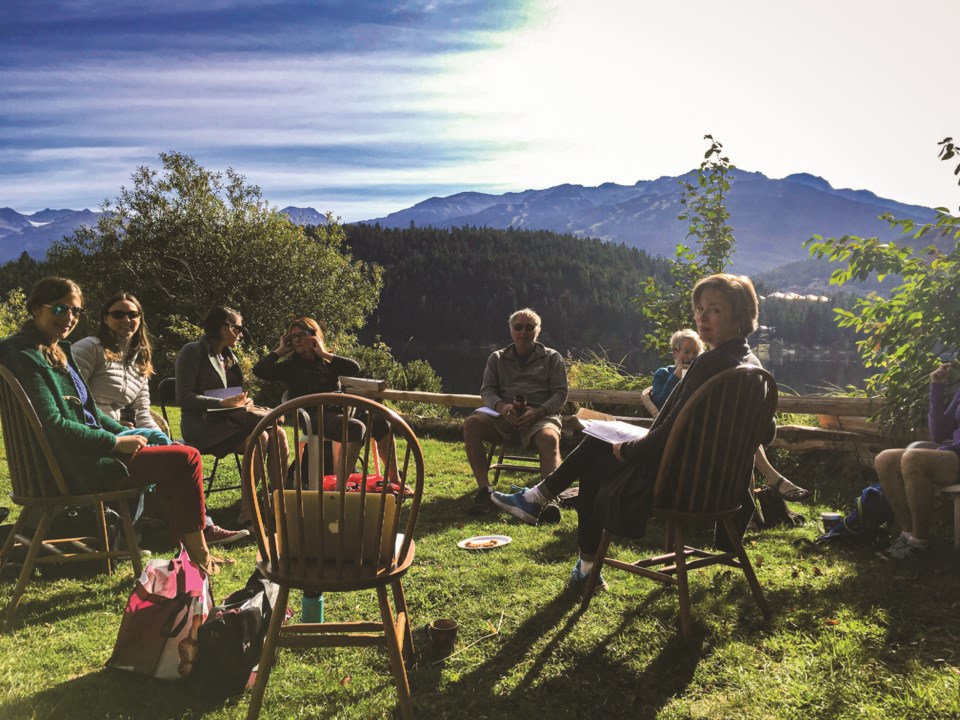Not long after Stella Harvey and her husband arrived in Whistler about 20 years ago, she went down to the library to see if there were any active writing groups she could join. Turns out, there wasn’t, but head librarian Joan Richoz encouraged her to start one anyway.
“Like the idiot I am, I started running rather than walking, and I put an ad in the paper,” says Harvey, the founder of the Whistler Writers Society.
She was astonished when 23 people showed up at that first meeting, many of whom are still involved in the Whistler Writers Festival that Harvey founded to this day.
The ever-humble Harvey probably would never admit this, but it was that small but significant act that set in motion an active community of writers in the Sea to Sky, which has produced an outsized number of published authors.
There’s Harvey herself, author of three novels, including, most recently, 2019’s Finding Callidora; short-story writer Katherine Fawcett (Swan Suit); children’s author Sara Leach (Duck Days); memoirist Jan Redford (End of the Rope); poet and short-story writer Mary MacDonald (The Crooked Thing); memoirist, novelist (and former CIA officer) Graham E. Fuller (Three Truths and a Lie); crime novelist Amber Cowie (Loss Lake); filmmaker and children’s author Rebecca Wood Barrett (My Best Friend is Extinct); science and ski writer Leslie Anthony (White Planet); culinary writer Jane Reid (Freshly Picked); non-fiction writer Stephen Vogler (Only in Whistler); and memoirist Susan Oakey-Baker (Finding Jim).
Phew. That is quite the list, especially for a part of the world more known for pumping out Olympians than award-winning writers–and that’s before counting all the other local scribes who have published work in magazines and literary quarterlies.
So what’s the secret? How has a corridor that counts less than 40,000 full-time residents produced such a long list of published authors (and I’m sure there’s even some I missed)? Is it something in the water? The wide support net of writers inherent to a collection of communities already known for being incredibly tightknit? Or is it simply a result of the Herculean efforts of the tireless Harvey? Let’s just say, all of the above.
“Creative people are drawn to wild places, so it’s not that surprising. I think there’s a lot of magic here in the mountains, in the rivers, by the ocean and I think that people who tell stories, they feel that,” muses Cowie, who lives in Squamish and adds that the landscape is imbued in much of her work.
Harvey believes it is simply an extension of the qualities of the Sea to Sky that have long existed here.
“You’re probably a risk-taker if you’re here and people in the community have had other lives and other careers, etc. and then you come here and you find your spot, you find your way,” she says.
But of course every fire needs a spark, and any writer who has ever met Harvey (and likely engaged in “one of those long, lovely Stella chats” as Cowie calls it) is sure to quickly recognize she has done more to advance the literary arts here than anyone before or since.
“Here’s my short answer: Stella Harvey,” says MacDonald, who joined Harvey’s writing group back in 2006 that has, save for a few changeovers in those early days, maintained the same seven members to this day. (In a testament to Harvey’s status among local writers, a group in Squamish is named The Stellas, a moniker that was intended as homage but mostly embarrasses her. “Don’t you dare mention that,” she tells me. Whoops!)
“I knew she was the voice of writing in Whistler. I knew she had started the festival, which was tiny back then. I just thought if there was a writing group that she was a part of, that would be the one to start in.”
Writing being such a grinding, solitary endeavour, there is immense value in the not only the emotional support a writing group can offer, but the accountability, says MacDonald.
“We somehow learned … how to bring our stuff to the table, to critique each other’s work in a really respectful way. But not to just do, ‘Oh, that’s really nice. That’s really nice what you wrote. So pretty,’ which isn’t helpful in terms of getting published or bettering your writing. But also, how do you critique and not cut to the bone?” she says.
A self-admitted people person, Harvey has also managed—through the constellation of writing groups she helped create, a writer-in-residence program, a partnership with SFU that sees her mentor local writers, and the festival itself—to offer a platform for burgeoning authors to take their work to the next level and even get that manuscript off the slush pile.
“The other thing Stella does … is she brings the festival every year and for the last few, she’s brought in publishers [to meet with writers in person]. It’s a ridiculously expensive session but it sells out faster than any other session in that festival,” notes MacDonald, who met with three publishers at the festival one year, all three of whom asked to read her manuscript, leading to her
“Many authors that I choose to feature at the festival, they are not necessarily the big names,” Harvey says. “The goal is to have people who are less known on the same stage with people who are very well known. I get audience members coming up to me and say, ‘You know, I came to see so and so, but I discovered so and so.’ And that’s what I want.”
Learn more at whistlerwritersfest.com.





